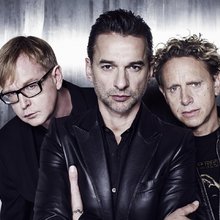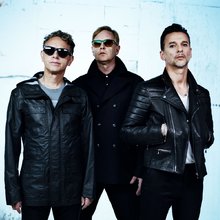Depeche Mode were the quintessential Eighties techno-pop band, parlaying a fascination with synthesizers into huge success on the British charts (where its albums consistently went Top 10) and eventually on the U.S. pop chart. Whereas a more traditional four-piece rock band might feature three members playing instruments and the fourth singing and perhaps playing guitar or bass, the lineup of this British group — whose name was inspired by a French fashion magazine — was described like this in a 1993 press release: "Dave (Gahan) is the singer, Martin (Gore) the songwriter, Alan (Wilder) the musician, and Andrew (Fletcher) the coordinator."
Depeche Mode's stark, synthetic sound and moody, provocative lyrics buck classic pop convention, to the extent that techno music innovators in Detroit and London regularly cite the band as a major inspiration. But for decades now, Depeche Mode also inspired countless alternative rock, indie, and even metal bands — possibly because the hooks that distinguish their most popular songs are among their era's most ingratiating. For a time, though, the group shared an unfortunate trait with numerous more conventional rock bands: a troubled, drug-addicted lead singer.
When Depeche Mode's original members united in 1980, in the working-class London suburb Basildon, they gravitated toward synthesizers and drum machines in part because they were easy to carry around and didn't require amplifiers. In fact, they took the train to their early gigs in local pubs. The group's recording career began auspiciously: 1981's dance beat-ridden Speak and Spell (Number 192) became one of the year's best-selling albums in England. Shortly after its release, though, principal songwriter Vince Clarke left. He eventually formed the electropop bands Yazoo and, later, Erasure.
But Depeche Mode bounced right back with 1982's A Broken Frame (Number 177), on which Gore assumed chief songwriting duties; soon after, Alan Wilder, who had toured with the band earlier, joined as a full-time member. Two years later the band released the critically and commercially groundbreaking Some Great Reward (Number 51), whose songs ranged from the bitter and shocking "Blasphemous Rumours" to "People Are People," a catchy plea for tolerance that went to Number 13 in the U.S., where Depeche Mode had previously been considered an obscure alternative act.
In spite of its success in America, where they were selling out arenas, Depeche Mode didn't have another U.S. hit until "Personal Jesus" (Number 28, 1990), its first gold single. Violator(Number 7, 1990), the album that single introduced, also yielded the group's first Top 10 single, "Enjoy the Silence" (Number 8, 1990). Songs of Faith and Devotion (1993) was heralded by critics as a bold foray into warmer musical textures and more spiritual imagery. It also entered the American pop album chart at Number One.
But after another successful tour, Gore and Fletcher were physically exhausted from the band's 18 months on the road and Wilder had become disenchanted and left the group (he later formed the largely instrumental project Recoil). Most disturbingly, Gahan slashed his wrists in a suicide attempt in August 1995. The now-trio had already begun to record its next album when Gahan took a near-lethal overdose of heroin and cocaine in May 1996; he actually flatlined for a few minutes. Soon after regaining consciousness, the singer was arrested for drug possession and sentenced to rehab. He emerged from the program clean and sober, and later spoke frankly in interviews about how he had believed he had to live the pain of Depeche Mode's songs to perform them (although Gore wrote the lyrics).
The group released Ultra in 1997 and enjoyed a resurgence: The album went to Number Five in the U.S, and the singles "Barrel of a Gun" and "It's No Good" were popular Modern Rock tracks (Number 11 and Number Four, respectively, on that chart). Though the band declined to tour in consideration of Gahan's still-new sobriety, they did return to the stage to support The Singles 86-98 (Number 38) the following year.
Depeche Mode continue to reach the Top 10 in the States. Exciter, influenced by minimalist rave music and produced by British techno hitmaker Mark Bell of LFO, came out in 2001 and charted at Number 8; Praying The Angel (Number 7, 2005) — with songs written by Gahan, not Gore — and Sounds Of The Universe (Number 3, 2009) followed.
There have also been expanded remasters of their old albums, a live DVD-CD set called Touring The Angel: Live In Milan, the retrospective set The Best Of, Volume 1 (Number 148, 2006), the digital box set The Complete Depeche Mode, and limited-edition live CDs of individual shows, released under the names Recording The Angel and Recording The Universe. Since 2000, only one single, "Precious" (Number 71, 2005) has hit the Hot 100 in the U.S. But the band continues to be a top-tier touring draw. Despite its being preceded by occasional cancellations in Europe (due to Gahan experiencing gastroenteritis and a Gahan leg injury), the band's 2009 U.S. tour was the country's 20th highest grossing of the year.
Delta Machine (2012–present)
In October 2012 during a press conference in Paris, Dave Gahan, Martin Gore and Andy Fletcher announced plans to release a new album and a worldwide tour starting from Tel Aviv and continuing in Europe and North America in the year 2013. Martin Gore revealed that Flood mixed the album, marking the producer's first studio collaboration with the band since 1993's Songs of Faith and Devotion.
In December 2012, the band officially announced signing a worldwide deal with Columbia Records and releasing a new album in March 2013. On 24 January 2013, it was confirmed that the album was called Delta Machine.[100] "Heaven", the debut single from Delta Machine was released commercially on Friday 1 February 2013 (although not in the UK). The release date in the UK was pushed back to 18 March 2013 (17 March 2013 on iTunes), currently with no explanation. Bafflingly, the physical release still bore the Mute Records logo, even though the band have now severed ties with their long standing label. Andy Fletcher mentioned in an interview this was due to their "devotion" to the label and with the band's insistence.
In March, the band announced North American dates to its 'Delta Machine' summer tour, starting 22 August from Detroit and ending 8 October in Phoenix.[101] In June, other European dates were confirmed for early 2014. The final gig of Delta Machine Tour took place in Moscow (Russia) on 7 March 2014, at Olimpiski venue.
In March 2014, Depeche Mode won the award for "Best International Group – Rock / Pop" at the ECHO Awards in Germany. Also they were nominated at the category "Album des Jahres (national oder international)" for Delta Machine, but lost against Helene Fischer Farbenspiel.

